

Renaissance Literature - Literature Periods & Movements. Literature Network » Literary Periods » Renaissance Literature The Renaissance in Europe was in one sense an awakening from the long slumber of the Dark Ages.
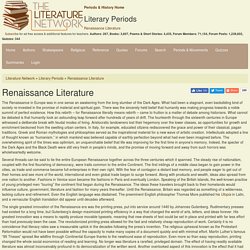
What had been a stagnant, even backsliding kind of society re-invested in the promise of material and spiritual gain. There was the sincerely held belief that humanity was making progress towards a noble summit of perfect existence. How this rebirth – for Renaissance literally means rebirth – came to fruition is a matter of debate among historians. What cannot be debated is that humanity took an astounding leap forward after hundreds of years of drift. Several threads can be said to tie the entire European Renaissance together across the three centuries which it spanned. The Influence of the Renaissance. The historical period known as the Renaissance spans from about the 15th to 17th centuries.
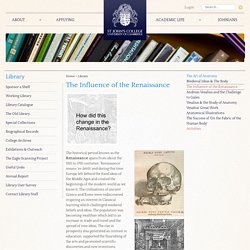
Italian Renaissance (1330-1550): Important Terms, People, and Events. Terms Feudalism - A combined economic and social system that defined the Middle Ages.
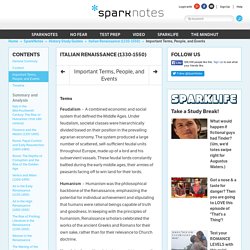
Under feudalism, societal classes were hierarchically divided based on their position in the prevailing agrarian economy. The system produced a large number of scattered, self-sufficient feudal units throughout Europe, made up of a lord and his subservient vassals. These feudal lords constantly battled during the early middle ages, their armies of peasants facing off to win land for their lords. Renaissance Conflict and Rivalries: Cultural Polemics in Europe, c. 1300–c. 1650.
PIERO DELLA FRANCESCA, Battle between Heraclius and Chosroes. 1452-66 Funded by the Levehulme Trust (September 2012–August 2015)
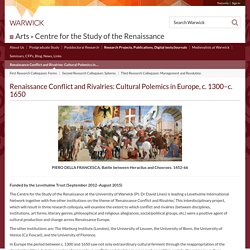
Multiculturalism Gone Wrong: Spain in the Renaissance. We can look at the past in different ways.
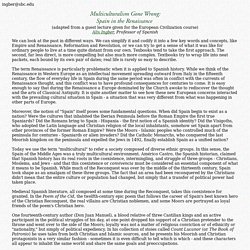
We can simplify it and codify it into a few key words and concepts, like Empire and Renaissance, Reformation and Revolution, or we can try to get a sense of what it was like for ordinary people to live at a time quite distant from our own. Texbooks tend to take the first approach. The second, far less direct, is more compelling but also much more complex. Textbooks try to wrap life into neat packets, each bound by its own pair of dates; real life is rarely so easy to describe. The term Renaissance is particularly problematic when it is applied to Spanish history. The poem's subject matter is clearly indicated in its title. History of the Renaissance in Europe: A rebirth, renewal, rediscovery. The Renaissance Beginning And Progress Of The Renaissance Edited By: R. A. Guisepi Fourteenth To Sixteenth Century.
Renaissance Art - Facts & Summary. Essential Humanities. [cite] MLA"Medieval Literature.
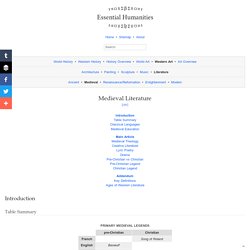
" Essential Humanities. Medieval Literature. Facts and interesting information about Medieval Life,specifically, Medieval Literature Medieval Literature - The Dark Ages and the BardsEnglish Medieval literature had, so far as we know, no existence until Christian times of the Dark Ages when Latin was the language of English literature.
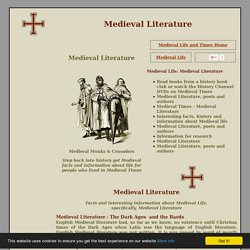
English Medieval literature was not written. It is was passed by word of mouth from one generation to another by English, Welsh and Irish bards. Middle Ages, Influence of Christianity. During the reign of Clovis, Christianity began to lift Europe from the Dark Ages.
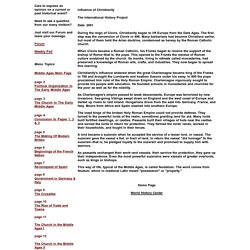
The first step was the conversion of Clovis in 496. Many barbarians had become Christians earlier, but most of them held the Arian doctrine, condemned as heresy by the Roman Catholic church. Medieval History, Castles. MedievalPlus.com The Middle Ages is a period in European history which, along with its adjective ‘Medieval’, was first referred to by italian scholars and academics of the late fifteenth century.
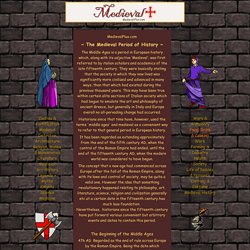
They were basically stating that the society in which they now lived was significantly more civilized and advanced in many ways, than that which had existed during the previous thousand years. This may have been true within certain elite sections of Italian society which had begun to emulate the art and philosophy of ancient Greece, but generally in Italy and Europe overall no all-pervading change had occurred.
Historians since that time have, however, used the terms 'middle ages' and medieval as a convenient way to refer to that general period in European history. Dr. Lynn H. Nelson, Emeritus Professor, Medieval History, KU. I'm not in love with the idea of "the contributions" of the past.
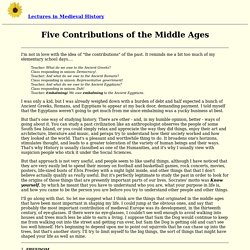
It reminds me a bit too much of my elementary school days.... Teacher: What do we owe to the Ancient Greeks? Class responding in unison: Democracy!. Teacher: And what do we owe to the Ancient Romans? Class responding in unison: Representative government! I was only a kid, but I was already weighed down with a burden of debt and half expected a bunch of Ancient Greeks, Romans, and Egyptians to appear at my back door, demanding payment. But that's one way of studying history. But that approach is not very useful, and people seem to like useful things, although I have noticed that they are very easily led to spend their money on football and basketball games, rock concerts, movies, posters, life-sized busts of Elvis Presley with a night light inside, and other things that that I don't believe actually qualify as really useful. I'll go along with that.